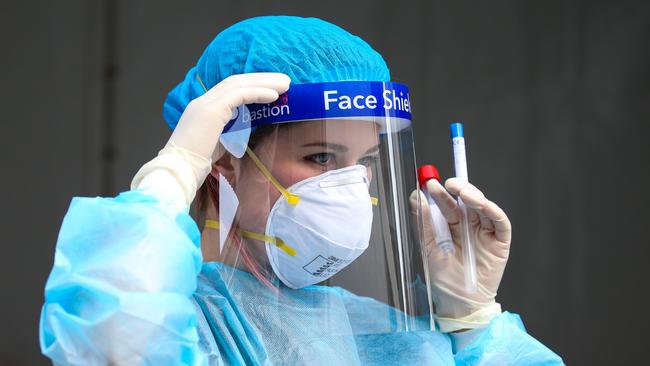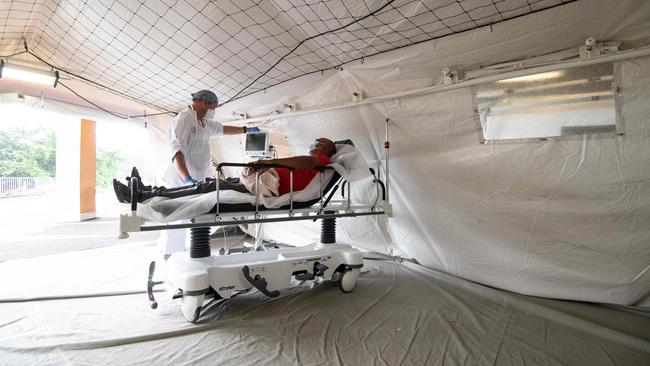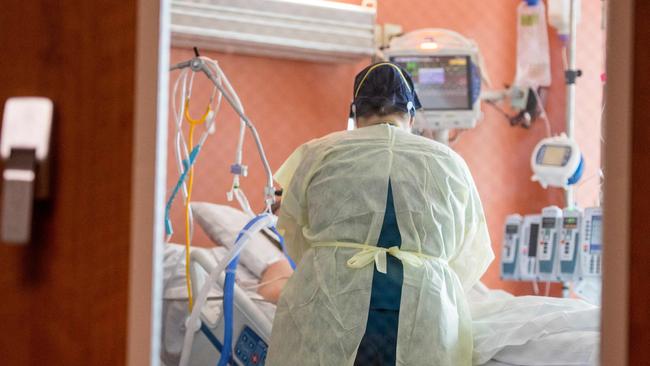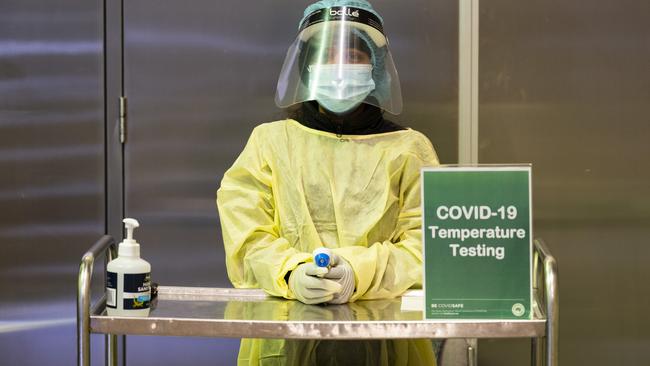Study reveals long-term effects of Covid-19 ‘worse than cancer’
People who have survived covid are experiencing symptoms so severe they are struggling to walk up stairs months later, according to research.
Health
Don't miss out on the headlines from Health. Followed categories will be added to My News.
The horrific and lasting effects of Covid-19 on people – asymptomatic or not – has been published in a new study, as scientists and health experts learn more about the long-term toll the virus can take.
Long-Covid has long been known about, but this study – which compared the Covid-19 sufferers with cancer patients – shows just how devastating its impact can be for sufferers. It found many had trouble with everyday chores or even difficulty walking up a flight of stairs months after recovering from the virus.
The data from the US Centres for Disease Control and Prevention (CDC) reveals more about the experience of “post Covid-19 conditions”. It comes as the World Health Organisation (WHO) urged people struggling with the effects to seek medical help.
The study, Outcomes Among Patients Referred to Outpatient Rehabilitation Clinics After Covid-19 diagnosis, compared both the physical and mental effects of 1295 patients with post-Covid-19 symptoms with another group of 2395 cancer patients (who have not had Covid), from January 2020 until March this year. All patients had been referred to outpatient rehabilitation.
Post-Covid conditions can range from new, returning or ongoing health problems, with scientists becoming “more and more concerned” about long-Covid.
The research revealed more than one-third of people with post Covid-19 symptoms are struggling to work from home, navigating stairs or running errands.
A greater number of Covid-19 patients also said their mental health was poor.
Some of those in post-Covid care were found to be twice as likely as the cancer patients to be in poor physical health or in pain.
“Among patients referred to outpatient rehabilitation, those recovering from Covid-19 had poorer physical health and functional status than those who had cancer, or were recovering from cancer but not Covid-19,” the research said.
The authors wrote: “Compared with control patients, post-Covid-19 patients were more likely to be male, younger, in the labour force.”
Post-Covid-19 patients were also more likely than the control group to have received a diagnosis of generalised muscle weakness or fatigue (72.7 per cent versus 42.3 per cent), and had higher prevalences of reported fair or poor general health (32.9 per cent versus 25.4 per cent), poorer physical health (44.1 per cent versus 32.6 per cent) and difficulty with physical activities (32.3 per cent versus 24.2 per cent).
Post-Covid-19 patients also reported a higher prevalence of fair or poor overall mental health than control patients (19.1 per cent versus 15.3 per cent).
There was also increased difficulty completing chores (38.2 per cent versus 25.2 per cent), navigating stairs (40.2 per cent versus 18.3 per cent), running errands or shopping (34.3 per cent versus 16 per cent) and walking for 15 minutes (38.2 per cent versus 16.6 per cent).
Meanwhile almost 40 per cent of Covid-19 patients had difficulty working at home versus 20 per cent of the control patients, adding it was a challenge to participate in activities.


More than 200 post-Covid symptoms have been reported, including chest pain, tingling, rashes and “brain fog”, according to WHO.
The study’s authors warned that the new research has “implications during and after the Covid-19 pandemic” as post-Covid conditions become a growing threat to the healthcare system.
“Post-Covid-19 patients did not perform as well as control patients on a measured
assessment of physical functioning,” the report concluded.
“Post-Covid-19 patients used more rehabilitative services than control patients.
“These findings indicate that among patients referred to outpatient rehabilitation, those recovering from Covid-19 might have poorer physical health and functional status than do patients with cancer but not Covid-19, and could benefit from additional clinical support, including tailored physical and mental health rehabilitation services.

LONG-COVID NOT LINKED WITH AGE
In an article for The Conversation, clinical director Professor Trevor Kilpatrick and director Professor Steven Petrou of the Florey Institute of Neuroscience and Mental Health backed research that long-Covid is no longer thought to be directly linked with either age or how severely ill they get.
“So younger people, and people with initially mild Covid, can still develop long-Covid symptoms,” they write.
The professors noted a study from the Imperial College London suggesting symptoms remain for up to 24 per cent of confirmed Covid cases, “at least three to four months after infection”.
As healthcare facilities struggle around the world coping with Covid-19 admissions – oxygen supplies are running out in the United States and NSW hospitals are already “under stress” as Covid infections surge – the news that Covid-19 patients averaged nine outpatient rehabilitation visits compared with five visits for the control group are concerning.
“These findings have implications for healthcare systems during and after the Covid-19 pandemic,” the study’s authors write.
“Patients recovering from Covid-19 might require tailored physical and mental health rehabilitation services.”

But there’s still a lot we need to learn, according to Professor Kilpatrick and Professor Petrou.
“There are major unanswered questions about long-Covid which require investigating, including how the disease takes hold, what the risk factors might be and the range of outcomes, as well as the best way to treat it,” they wrote.
“It’s crucial we begin to understand what causes the wide variation in symptoms.
“This could be many factors, including the viral strain, severity of the infection, the effect of pre-existing disease, age and vaccination status, or even the physical and psychological supports provided from the start of the disease.”
Originally published as Study reveals long-term effects of Covid-19 ‘worse than cancer’





